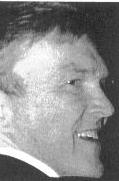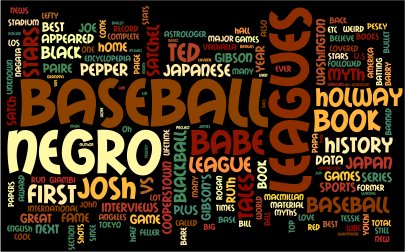Articles
Notice: all material presented herein is the author's copyrighted property.
WBC 2006
![]() Japan
Beat us in Baseball; That's the Good News
Japan
Beat us in Baseball; That's the Good News
![]() John
Holway /
Negro
Leagues &
the
japanese insider
John
Holway /
Negro
Leagues &
the
japanese insider
 About
the Author
About
the Author
![]() Has been
researching baseball since 1944.
Has been
researching baseball since 1944.
Holway saw his first Negro League game -- Satchel Paige's Monarchs against Josh Gibson's Grays -- in Washington in 1945.
After a stint as a parachute lieutenant in Korea, he wrote his first book in Tokyo in 1954, "Japan Is Big League in Thrills," the first book ever done in English on Japanese baseball. This was followed in 1955 by "Sumo," the first English book on that subject.
His next book, "Voices From the Great Black Baseball Leagues," appeared in 1976, a collection of interviews with the then virtually unknown Cool Papa Bell, Buck Leonard, Bill Foster, Willie Wells, and others. That was followed by "Blackball Stars," "Black Diamonds," "Josh Gibson," and "Josh and Satch."
 With Dick Clark he edited
the Macmillan Encyclopedia's Negro League section, based on research into
many hundreds of box scores from papers across America.
With Dick Clark he edited
the Macmillan Encyclopedia's Negro League section, based on research into
many hundreds of box scores from papers across America.
With Yoichi Nagata he has been a contributor to the "Total Sports Baseball Encyclopedia" Japanese baseball section.
Other books include "The Last 400 Hitter" (1991) and "The Baseball Astrologer and Other Weird Tales" (1999), the first comprehensive study of the unseen half of baseball, the psychic side of the game.
Holway also did a major oral history of the Tuskegee Airmen -- "Red Tails, Black Wings."
In 2001 his monumental "The Complete Book of the Negro Leagues, the Other Half of Baseball History" came out, the most ambitious project ever undertaken on the Negro Leagues. The data base had been more than doubled since the Macmillan Encyclopedia. Using the Total Sports format, the book goes into detail year by year, with statistics on every player by team, plus text and stats on the Cuban Leagues, Puerto Rico, and the great post-season games, plus matchups against the best white stars -- Ruth, Cobb, Mathewson, Johnson, Feller etc etc.
Holway is now working on two more spinoffs: The first is "More Blackball Tales," the third in a trilogy of interviews with old-time black vets, most of whom are deceased. The second, "Super Stars of Black Baseball," a Register of the 100 best blacks before Jackie Robinson. It will pull together the lifetime stats for Josh Gibson, Satchel Paige, and all the greatest stars of the blackball days.
The data correct many myths, and reveal a lot of new surprises.
Paige did not pitch in 3,000 games and win 1,000 of them. In fact, he won only one game more than Bullet Joe Rogan and the still unknown Ray Brown, both of whom lost a lot less.
Cool Papa Bell did not lead the Negro Leagues in steals, Oscar Charleston did.
Gibson, surprisingly, turns out to be the lifetime leader in batting average as well as home runs. He did not hit 962 homers or 69 in one year, as the myths say. But the data suggest that, had he played in the integrated majors, he would almost surely have broken Babe Ruth's record within a decade after the Babe set it.
His newest book baseball is, "TED, the Kid", published in 2006 by Scorpio Books. More recently, 2012 he published, "Bessie Coleman Pioneering Black Aviator"
A former economics analyst for the Voice of America, Holway has covered international conferences around the world. He has written for The New York Times, the Washington Post, Sports Illustrated, Baseball Weekly, The Sporting News, American Heritage, Chicago Tribune, Los Angeles Times, and other major newspapers from Miami to Seattle, from Boston to San Diego, plus international papers from Tokyo to Johannesburg and from Melbourne to Warsaw. He has covered Olympic Games in Mexico City and Los Angeles and World Series from 1948 to 1986.
His interviews with some of the top players of the All-American Girls League have also appeared in various publications.
He has appeared on CNN, ABC-TV, and the History Channel.
A former chairman of SABR's Negro Leagues committee, Holway has received the Bob Davids Award and the Casey Award for "Blackball Stars," voted the best baseball book of 1988.
Personal Endorsements
![]() My new web site project BaseballAces.net
My new web site project BaseballAces.net
Contact
![]() Email John
Holway
Email John
Holway![]()
